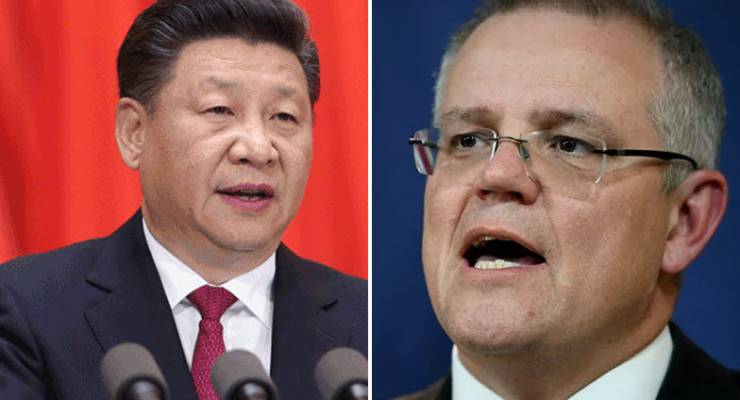
It is now clear that something of a perfect storm has settled atop the China-Australia relationship and there are few signs that it will be moving on anytime soon.
The stoush between Australia and its biggest trade partner over security — and most explicitly Chinese interference in Australian politics, education and research — comes at a time when the Morrison government is desperate to reopen the economy in the wake of the COVID-19 shutdowns.
Yet growing hysteria by the federal government about the Victorian Labor government’s strict lockdown being a dead weight on the Australian economy is at sharp odds with the ongoing program of testing Beijing at every turn.
The Morrison government has chosen the precise moment when Australia’s economy is most vulnerable, with growth contracting at record rates, to pick a fight with our biggest trading partner.
That is not to say that Beijing should not be taken to task for its human rights abuses and its relentless campaign for influence in other nations. But when Australia begins saying and doing things it well knows will upset Beijing and result in retribution, there should surely be some sort of goal, an endgame.
There is a real sense that the various left and right hands in Canberra either don’t know what the other is up to, or are simply failing to properly co-ordinate in pursuit of unclear — or perhaps unknown — goals. This is likely a function of the security forces and defence, rather than professional diplomats and trade experts taking the running on the relationship with China.
The expulsion of the last two correspondents for Australian news media outlets in China is a case in point. At first blush it looked like journalists Mike Smith and Bill Birtles were the victims of China’s aggressive tit-for-tat over Australia banning of Chinese tech company Huawei, unilateral demands for a COVID-19 inquiry, “interference” over Hong Kong, etc. But it’s now clear it was directly in response to Australia’s own thuggish behaviour.
As Marise Payne was giving a media conference on Monday fulminating about how the Australian government is on the side of press freedom, she omitted that ASIO had raided the homes of Chinese journalists on June 26. It was likely this that precipitated the events that saw Smith and Birtles bundled out of China on the advice of DFAT.
It unclear when DFAT found out about the raids but it appears to be at least six weeks after Chinese-Australian broadcaster Cheng Lei was detained. There are other questions as to exactly what information DFAT had been given and by whom but it seems that the Chinese plan was to force the Australian journalists to leave — rather than have to detain and then expel them.
As China observers have all noted, if Chinese authorities had wanted to pick up the Australians and spirit them away they could have done so at any time. In China, there is no warning.
Instead, authorities chose a very obvious tactic of a midnight door knock and low-level questioning. These are not the actions of secret police who plan to detain people; they are the actions of a government trying to intimidate people into running.
But rather than sit back and consider the events over the 10 weeks since June 26 — which included an olive branch offered, a little clumsily, by Beijing’s deputy ambassador a week earlier — Canberra has kept doubling down.
Eschewing the olive branch, it launched another enquiry into Chinese influence, this time in universities, and then yesterday cancelled the visas of two long-term Chinese academics. These are precisely the type of actions that we have long taken issue with China doing.
Are we to see an ongoing witch hunt among China-born academics? Where does it end — does Canberra start burning books it does not like? Raiding journalists and expelling academics is the behaviour of a paranoid police state.
But really we should not be surprised. The Australian Federal Police and spy agencies now raid Australian journalists with impunity. Elected officials simply refuse to answer legitimate questions or obfuscate. We take China to task for its secret court cases and opaque legal system, yet we are mimicking precisely the behaviour we profess to stand against when it comes to cases like Bernard Collaery and Witness K.
More internal contradictions, no wonder no plan can be discerned.
Meanwhile China is taking each win as it comes. The latest Chinese import figures show that Beijing’s economic tit-for-tat is working as Australian sales to China are crashing.
As Australia bumbles along, busy getting tough with China without any plan — all tactics and no strategy, as former ambassador to China Geoff Raby wisely notes — Beijing will ratchet up the pressure at will until, perhaps, Australia rediscovers diplomacy, or at least a sense of purpose.
Until then, Beijing will continue to do us slowly.








Crikey is committed to hosting lively discussions. Help us keep the conversation useful, interesting and welcoming. We aim to publish comments quickly in the interest of promoting robust conversation, but we’re a small team and we deploy filters to protect against legal risk. Occasionally your comment may be held up while we review, but we’re working as fast as we can to keep the conversation rolling.
The Crikey comment section is members-only content. Please subscribe to leave a comment.
The Crikey comment section is members-only content. Please login to leave a comment.